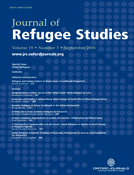-
Views
-
Cite
Cite
Katarzyna Grabska, Marginalization in Urban Spaces of the Global South: Urban Refugees in Cairo, Journal of Refugee Studies, Volume 19, Issue 3, September 2006, Pages 287–307, https://doi.org/10.1093/jrs/fel014
Close - Share Icon Share
Abstract
The paper explores the marginalization of Sudanese refugees in Cairo, arguing that although socially, economically, culturally and politically marginalized, refugees participate and contribute to the transformation of urban spaces in Cairo, as they do elsewhere in the developing world. The paper finds that in terms of legal security and livelihood coping strategies, there is little difference between those refugees with legal status and those residing illegally in Egypt. Despite social exclusion and lack of access to rights and services, some Sudanese refugees balance risks and costs of marginalization to advance their livelihoods. In general, in the context of lack of full integration possibilities in Egypt and inadequate assistance provided by the United Nations High Commissioner for Refugees Office and international and local organizations and faith-based institutions, refugees come up with creative ways of managing their livelihoods, contributing both economically and culturally to the host society. In this context, refugees are seen as social agents, rather than an economic burden for the host country.


